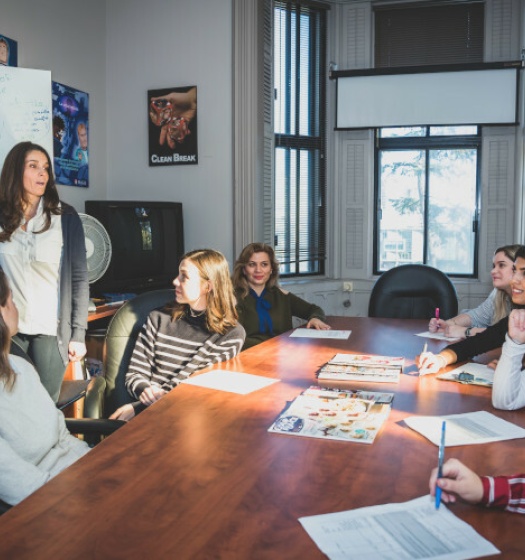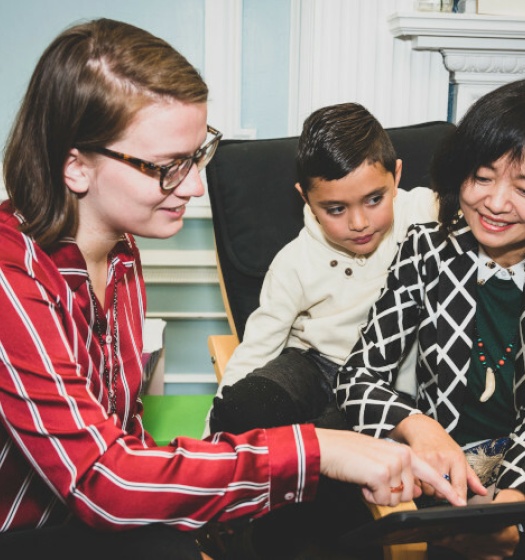When it comes to identifying a learning difficulty, time is of the essence. The sooner a child receives the support they need, the more likely they are to succeed at school, and ultimately, in life. Sadly, for hundreds of families in Quebec and beyond, it can be hard to get an assessment, let alone the proper resources. Waitlists are full of families anxious to get professional help for their child.
A new gift of $3.75 million to the Faculty of Education from Daniel L. Gold, BCom’59, and Monica Gold, BCom’68, seeks to address this urgent situation.
The couple’s gift will establish the Daniel and Monica Gold Centre for Early Childhood Development and increase clinical support, training, and research in an effort to reach more children earlier in their lives.
“There’s such a great need in the community,” says Dr. Victoria Talwar, a professor in McGill’s Department of Educational and Counselling Psychology in the Faculty of Education, who will serve as the Centre’s inaugural director.
“There are lists of children, lists of parents. Parents who don’t know what’s typical or not typical,” adds Dr. Sheryl Smith-Gilman, former Associate Dean of Academics and an early childhood education expert in the Faculty’s Department of Integrated Studies in Education. “We need more specialists.”
Research shows that quality education and early intervention can help children reach their full potential and overcome obstacles to learning. For Smith-Gilman, a success story starts with early intervention followed by continued support in necessary areas, which could include speech, occupational, or behaviour therapy.
“Some students are waiting for a diagnosis of say Attention Deficit and Hyperactivity Disorder (ADHD) for several years. They’re waiting almost all of their elementary school years,” laments Talwar.
“And you need a diagnosis to access the supports,” explains Smith-Gilman.
Addressing an urgent need
Thanks to this support from the Golds, McGill Education will be able to expand its research and training to address wide-ranging challenges in early-learning development including ADHD, Autism, developmental delays, and other neurodivergences.
The gift will increase capacity in the McGill Psychoeducational & Counselling Clinic, launch a new graduate certificate for early-education intervention practitioners, fund the creation of digital training materials on learning and developmental difficulties for educators, and provide seed funding for related research.
“We feel strongly in the transformative power of early intervention in terms of development and education,” say donors Daniel and Monica Gold. “We want to contribute to giving all children the best start in life.”

With this gift, McGill Education will be able to expand its research and training to address wide-ranging challenges in early-learning development.
Expanding clinical work
McGill’s Psychoeducational & Counselling Clinic already assesses children for learning or development difficulties. Families are seen by supervised graduate students and are charged for the service on a sliding scale. After a child is assessed by the clinic, they can access psychoeducational support if needed, usually provided through the child’s school.
As a training clinic, it has dual objectives: to offer services to the local population and to train future psychologists.
The gift will provide funding for an additional supervisor for students, as well as additional administrators, allowing the clinic to remain open year-round and conduct more assessments. It currently shuts its doors every summer.
Early assessment, identification, and intervention can change a life.”
Dr. Marie-Hélène Pennestri, Director of Clinical Training, Associate Dean of Research and Graduate Studies in the Faculty, and an associate professor in the Counselling Psychology and School/Applied Child Psychology programs, says families who are able to access the clinic’s services receive a high level of care.
“Part of our training is also to teach our graduate students how to be sensitive and empathic when telling a parent that their child – the individual they love the most in the world – has a challenge,” she explains. “The need is beyond urgent to see more children more rapidly. The brain is still in development when you’re a young child and supporting children early on can significantly improve their short- and long-term development.”
Early detection also stands to improve family dynamics, she says.
“When you’re a parent and you’re worried, wondering what’s happening, it prevents you from being fully in a relationship with your child, because you’re stressed and you’re always wondering if there’s something wrong,” she adds. “Early assessment, identification, and intervention can change a life.”

McGill’s Psychoeducational & Counselling Clinic assesses children for learning or development difficulties.
Certificate program
Part of the gift is earmarked to establish a new graduate certificate program to train early-education intervention practitioners on how to work with children who may be presenting delays in social, emotional, linguistic, and/or cognitive areas.
The Centre hopes to welcome its first cohort of students for the certificate program in fall 2025.
Funding will also support faculty and student-led research in early childhood development and resilience within the educational context. This research reflects how the Centre’s outreach activities are built on best practices informed by scientific evidence.
The gift will also fund the creation of digital resources for early-education teachers to help them address emotion-regulation difficulties and anxiety among students, especially as related to ADHD/Autism and other neurodivergences.
Building on strengths
Smith-Gilman points to the interdisciplinary nature of McGill’s Faculty of Education, with expertise in teaching, psychology, physical education and motor development.
Work being done on early childhood development and education in the Faculty is founded on the Reggio Emilia Approach, Smith-Gilman’s own area of expertise. This approach recognizes the myriad ways in which children learn, including through play, art, dance, stories, and more.
“We’re taking the knowledge we have and focusing it on early childhood development to ultimately become a centre that’s a reference for the rest of the world,” she adds. “This gift is the mechanism to bring all this together in a way that hasn’t been previously done.”

